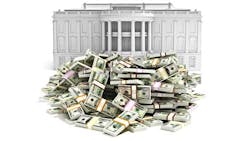Small Business Tells Congress to Get Cracking on Tax Reform
Comprehensive tax reform is the “top priority” of small businesses, the National Federation of Small Business (NFIB) told the House Ways and Means Committee chairman today, and it urged Congress to act this year on passing a bill. The call to action comes amid growing concern that tax reform won't occur until 2018 or possibly later.
Tax reform will have an “enormously positive impact on small businesses,” NFIB President and CEO Juanita Duggan told Rep. Kevin Brady, R-Texas, chairman of the House Ways and Means Committee, in a letter May 18. “Given that small businesses account for nearly half of the gross domestic product (GDP) and private sector workforce, and create two out of every three net jobs, the U.S. economy will not reach its full potential for growth without a robust and flourishing small business sector.”
Duggan laid out a list of imperatives for what should be contained in tax reform legislation:
- A tax code that is easier to comply with
- Small businesses have rate parity with their larger competitors
- Tax rates are reduced for all small businesses
Small optimism soared after the November election, Duggan noted. “The largest driver of this post-election optimism is small business owners’ expectations for better economic policies,” she said.
In April, however, NFIB’s Small Business Optimism Index fell to 104.5 as small employers became less enthusiastic about “expected business conditions.” Duggan said the drop occurred after Congress failed to repeal and replace the Affordable Care Act.
“The committee and Congress must understand that small business owners are paying close attention, and they are making decisions that affect the economy based on how Washington performs,” Duggan wrote. “The time to address small business owners’ biggest economic concerns is now.”
Tax reform promises to be even more challenging than health care reform, which still faces a lengthy legislative battle in the U.S. Senate. For example, deficit hawks such as the Concord Coalition said the plan outlined by the Trump Administration in late April would substantially raise the national debt.
“While the proposal lacks specificity, what was released today looks like a revenue loss plan more than a tax reform plan,” said Robert L. Bixby, Concord’s executive director, after the plan's release. “It is inconceivable that a tax cut of this magnitude could pay for itself through economic growth.”
In a May 8 analysis, William G. Gale of the Brookings Institution warned that along with raising the debt, the administration’s plan would create “an enormous tax shelter.” He explained, “By cutting the business tax rate to 15%, and setting up the income tax rate at 35% or higher, Americans will have an incentive to convert wage income into business income.”
Gale also said if the U.S. cuts its corporate tax rate to 15%, other nations will lower their tax rates in response and also raise their value-added taxes to make up the revenue shortfall.
“The U.S. doesn’t have a value-added tax, so as corporate rates are cut successively around the world, America’s revenue situation would get worse and worse,” Gale predicted.
Gale added that the president’s plan would also be “extremely regressive,” commenting that it would give “huge tax cuts to the highest income households and very small tax cuts to the lowest income households.”
All these problems are adding up to rising pessimism on Wall Street and in many corporate offices that a tax bill can be passed in 2017.
“It is just completely unrealistic to think they can get a big tax reform bill done this year,” Greg Valliere, chief global strategist at Horizon Investments, told Politico’s Ben White. “They haven’t even agreed whether they are doing tax cuts or tax reform. They haven’t decided if it needs to be paid for or not and I don’t think they appreciate just how big a fight the debt limit is going to be.”
About the Author
Steve Minter
Steve Minter, Executive Editor
Focus: Leadership, Global Economy, Energy
Call: 216-931-9281
Follow on Twitter: @SgMinterIW
An award-winning editor, Executive Editor Steve Minter covers leadership, global economic and trade issues and energy, tackling subject matter ranging from CEO profiles and leadership theories to economic trends and energy policy. As well, he supervises content development for editorial products including the magazine, IndustryWeek.com, research and information products, and conferences.
Before joining the IW staff, Steve was publisher and editorial director of Penton Media’s EHS Today, where he was instrumental in the development of the Champions of Safety and America’s Safest Companies recognition programs.
Steve received his B.A. in English from Oberlin College. He is married and has two adult children.
